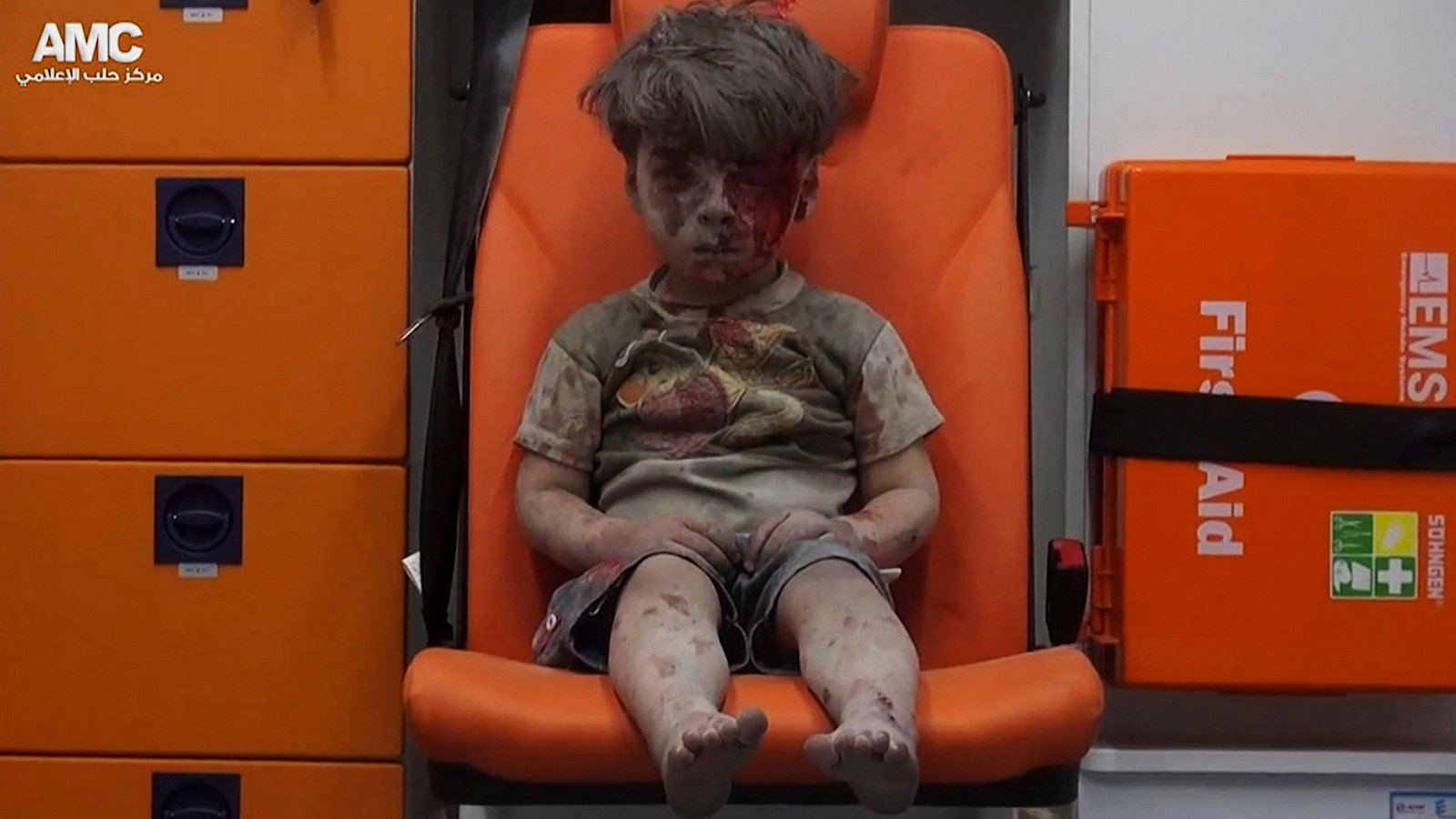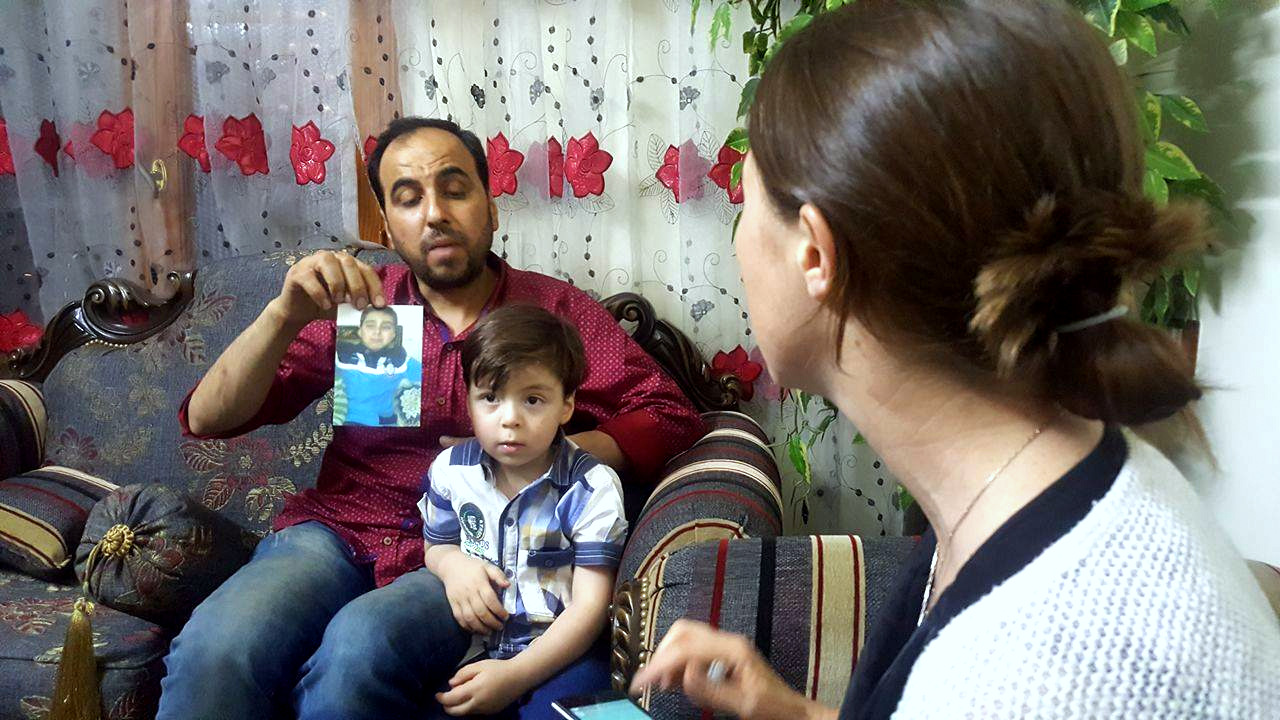
HOMS, SYRIA — On the evening of Aug. 17, 2016, an event that has yet to be adequately explained occurred in the Qaterji District of the Syrian city of Aleppo. Four-year-old Omran Daqneesh, as well as his siblings and parents, were injured in media alleged was an attack by the Russians – or the Syrian military, depending on what source one chose to believe. People in Aleppo suggested it could have been a strike by the US-led coalition. The reality is not yet known. The attack also claimed the life of Omran’s 11-year-old brother, Mohammad Ali Daqneesh.
Overnight, the world was introduced to Omran, who became the poster child of suffering in Syria due to extensive coverage by Western corporate media. The al-Qaeda-affiliated White Helmets, and subsequently the media, made the child’s injuries out to seem far more serious than they actually were.
CNN anchor Kate Bolduan “broke down” over a photo of the boy that was likely taken and propagated precisely to elicit such emotion. Video footage of Omran showed him seated in an ambulance, blank-faced and barefoot with blood drying on his face. The world was collectively heartbroken at seeing Omran – but was also misled about his story.
Most Western media blamed the Russians for Omran’s injuries – but some media outlets, including The Guardian, claimed that he’d been hit by a Syrian airstrike.
For its part, the Russian Defense Ministry denied allegations regarding Russia’s involvement in the incident. As Tim Anderson wrote at the time, ministry spokesman Igor Konashenkov said the Russian Air Force “never work[s] on targets within residential areas … [especially not in] al-Qaterji, mentioned by the Western media, as it is adjacent to the exit corridors for locals which were opened in the framework of the Russian humanitarian mission.”
Related: Hell Cannons – The Homegrown Horror of Syria’s Terrorist Invaders
Both Western and Gulf media would rehash the story of his injury in the coming weeks and months, but also omit some key facts in the process.
The source of the video footage showing Omran being put in the ambulance was the Aleppo Media Centre (AMC), which is funded by the West and promotes the “rebel opposition” narrative in Syria, relying on al-Qaeda sources. The journalists who took the video and photos are embedded in al-Qaeda-controlled areas.
Mahmoud Raslan, the photographer responsible for the viral photo of Omran, is known to be close to terrorists of the Nour al-Din al-Zenki faction, who are most widely known for their methodic beheading of Palestinian child Abdullah Issa in July 2016. After Issa’s slaughter, photos emerged of a grinning Raslan taking a selfie with some of the al-Zenki murderers.
If u doubt that Raslan took photo, see him taking pics & wearing same shirt as he wore in selfie w/beheaders #Syria pic.twitter.com/TNcHlyDNB1
— Ibn Walid (@walid970721) August 19, 2016
Father speaks out – Omran is happy and healthy
Omran’s father, Mohammad Kheir Daqneesh, had six children, including Omran and the late Mohammad Ali. In the year following the attack that injured Omran and his family, Mr. Daqneesh became sick of the way Gulf and Western media used the image of his son as propaganda to garner public support for further intervention in Syria.
He chose to speak out on June 5, 2017, giving interviews to Syrian media in which he gave his side of Omran’s story. He pointed out the ways in which Omran had been made into an icon without his knowledge or his family’s consent, as well as the false premises under which this was done.
Mohammad Daqneesh recalled scrambling to find Omran and his other children in the dark, moving them to safety before rescuing the rest of his family. At one point, Omran was taken to an ambulance by a White Helmets “volunteer,” with the iconic photo to be taken shortly thereafter while Daqneesh was still inside his home.
Mr. Daqneesh denied any knowledge of a Russian or Syrian airstrike, saying that he had not heard any airplanes at the time. He added that his son’s injury was mild, but had been exaggerated in the news, adding that Omran was at ease and had since returned to normalcy in his home in Aleppo.
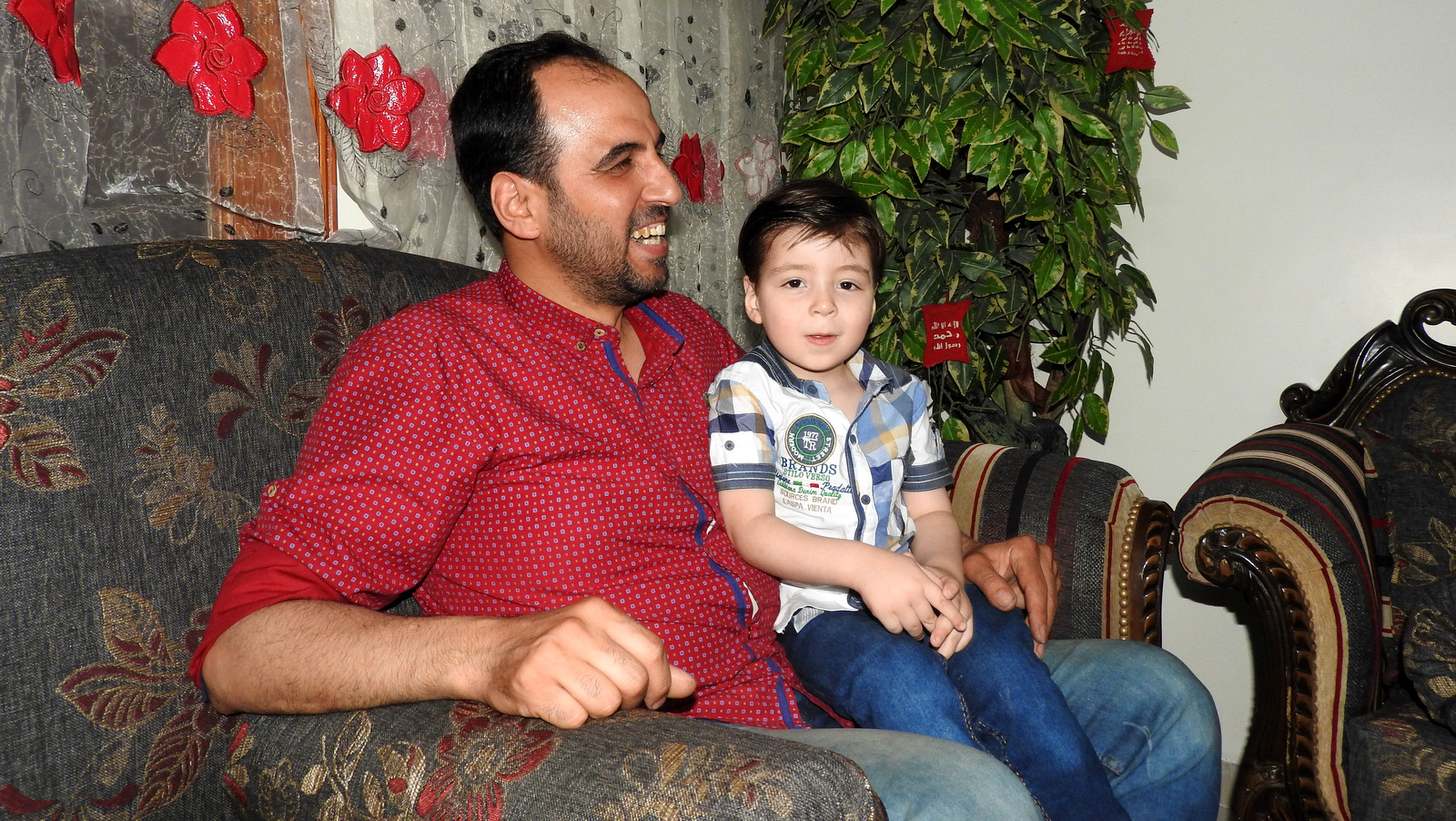
On June 6, I met with Omran and Mr. Daqneesh at their Aleppo home to inquire about the incident. In a small sitting room outside their apartment, Mohammad Daqneesh was able to provide some more answers.
On the August evening of the attack, Mohammad Daqneesh and his family were inside the first-floor apartment they had been renting since fleeing their original Aleppo neighborhood when “rebels” came into their district. Daqneesh described their area of Qaterji as having been calm, with “nothing happening” for most of the three years they’d been there.
“We were at our home in the Qaterji neighborhood when the strike happened. What caused it, I don’t know – we didn’t hear any sound[s] of airplanes or bombing. Suddenly everything went dark. Thank God, [Omran’s] injury was a light injury, very light. But they exaggerated and made a big deal out of it. I was also lightly injured on my head and arm, but [they were] very mild injuries,” Daqneesh said.
“My son Mohammad Ali was taking the trash out when suddenly the incident occurred and he was hit by rubble. His hands were injured and he suffered internal bleeding,” he said.
Ali ended up at the same hospital as Omran, where he stayed for three days before passing away. “I went there to find them and take them out of there. I needed some stitches, but I didn’t get it done there, I didn’t trust them. I asked a nurse elsewhere to do it,” Daqneesh said.
But the hospital in question had a dark side to it. Pierre Le Corf, a French citizen who has lived in Aleppo for over a year, looked into the hospital after eastern Aleppo was secured.
“The [hospital] was held and managed by [al-]Nusra and the Tahrir Party. It was funded and supported by SAMS (Syrian-American Medical Society), and there were SAMS posters all over the hospital. Doctors there were more like interns, not actual doctors but they received intensive training for a period,” Le Corf told me in Aleppo.
As the White Helmets are lauded with having had a widely-loved presence in eastern Aleppo (and other al-Qaeda occupied regions of Syria), I asked Omran’s father whether he had had any interactions with them prior to the August 2016 evening. He replied that he hadn’t and added:
“I saw nothing of them, but I heard a lot from other people. Some said they do help people and others said they steal their money, mobiles, etc from those they help.”
Related: John Pilger: The White Helmets Are A “Complete Propaganda Construct”
British journalist Vanessa Beeley, in her investigations into the White Helmets, heard far more sordid first-hand accounts when she visited the Jibreen reception center for displaced Syrians from eastern Aleppo areas in December 2016.
In the corporate media frenzy which followed that August 2016 night, Mahmoud Raslan—the star photographer of Omran in the ambulance—at one point described crying for Omran. I asked Mohammad Daqneesh about this, knowing of Raslan’s close affiliation with al-Zenki.
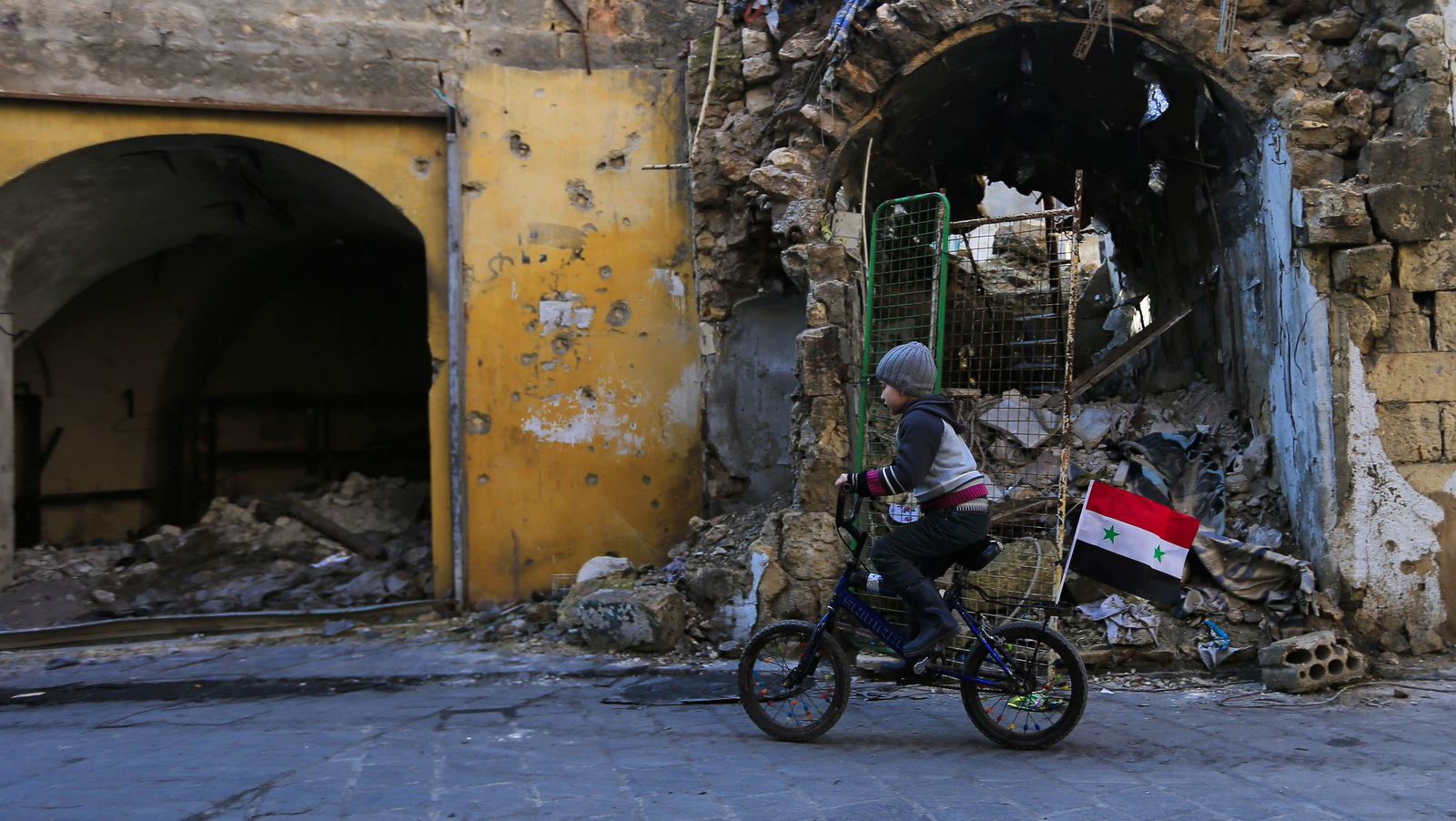
“If he cried and felt sorry for my child, that’s up to him. But if he cried to manipulate others feelings, that’s a different story. We see a lot of cases on the television which we cry for. But not like this slight injury,” Daqneesh said, touching Omran’s forehead.
To my question of whether the militants had attempted to intimidate or otherwise coerce Daqneesh into corroborating the narrative around Omran, he said:
They tried to pressure us to say that the Russian and the Syrian air forces hit us, but I can’t be a witness to something I didn’t see. They offered me money, travel out of Syria, residency, citizenship, employment, health insurance, and things like that. And they offered us their protection on the way out of Syria because the road, the Ramouseh road, was very dangerous. They wanted to put us inside an armored vehicle which would take us to the Turkish borders, through Bab Salame, with the help of the armed men.”
Assuming that Daqneesh is being “held under house arrest” as pro- “rebels” media have claimed, why then would he refuse this offer? I asked why he hadn’t left with them and what he thought of claims he was being forced to speak as he has done.
“Firstly, I am a Syrian citizen and my children have every right to live in this country. Also, it was simple (injury), why would I leave? I’ve gone back to my work. Some media have said that I live in Turkey now and my family and I left Omran alone. That’s all a lie.
I didn’t ask them to put us in the media and to trade with our blood. I didn’t ask them to take photos and write stories about us. They imposed themselves on us and did all that. Now they are saying that I’m a traitor, that I betrayed the country and that I’m sitting with a criminal.
I stay only where I am convinced is right for me, and I recommend that they return to their senses. Enough damaging this country, they came here and caused us all this damage and harm, I am asking them to back off and to leave this country and people alone. Enough is enough.”
“Rescuers” Traded Blood for Photo Op
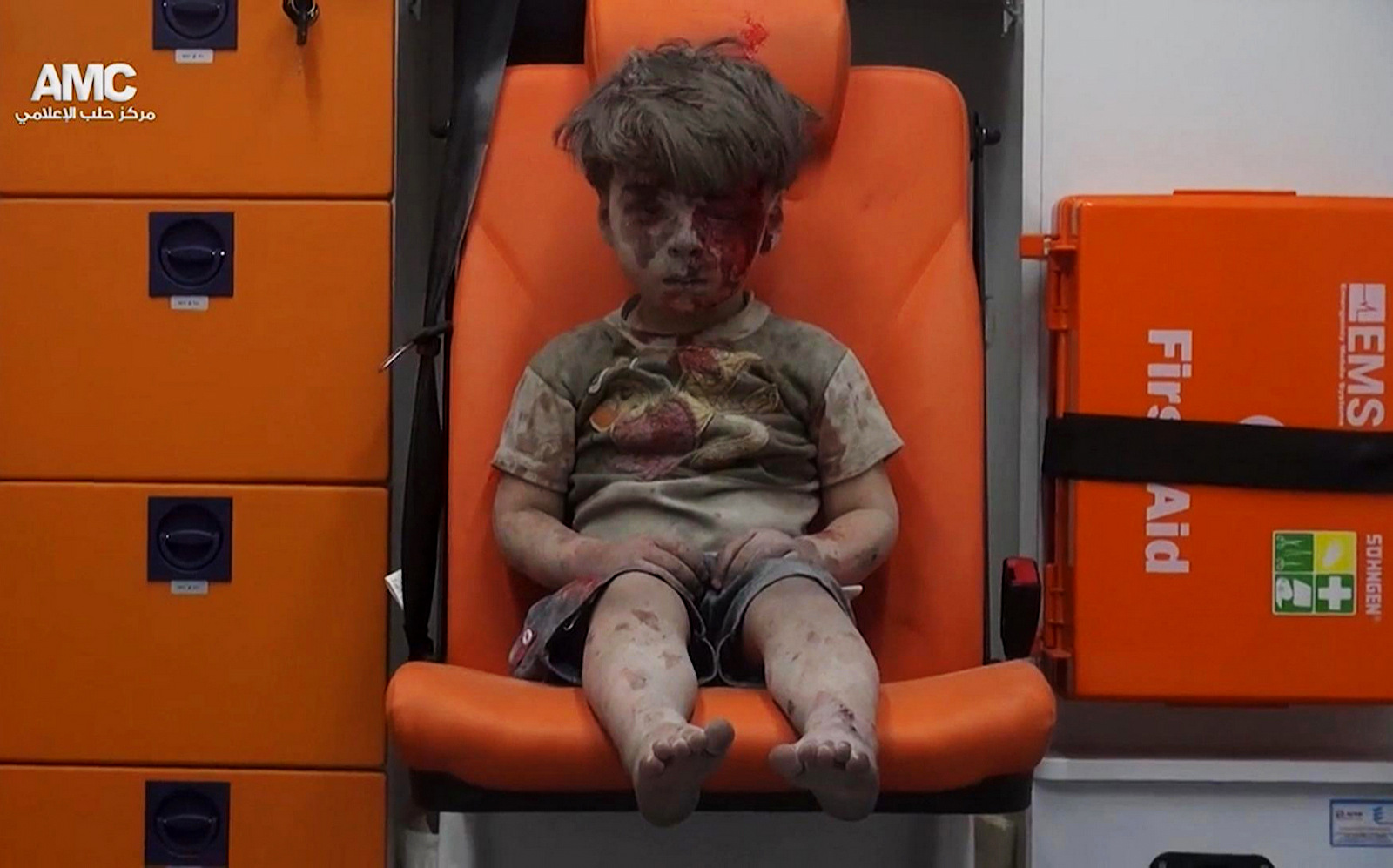
Syrian journalist Khaled Iskef is largely responsible for bringing the true story of Omran Daqneesh to light. Through months of dialogue with Mohammad Daqneesh, Iskef’s urging him to talk to the media, eventuated on June 5th.
In meetings with Iskef in Aleppo, he told me about something even more disturbing than the exploitation of Omran Daqneesh: according to Iskef’s investigations through talking with Daqneesh and his friends, the White Helmets “rescuers” first grabbed one child for their “rescue” photo op, but when they saw undeniably adorable Omran, they took him instead, leaving the first child aside. Trading blood, as Daqneesh said.
Iskef spoke of why Daqneesh changed his mind about speaking to press.
“He refused any media because of what’s happened with his child. When you think of how Western media treated the child, his reaction to any media was to refuse. I kept telling him you must talk to the media.”
Watch | CNN reporter Kate Bolduan sheds tears for Omran Daqneesh
Mahmoud Raslan, the photographer of that famous photo, is now in Idlib, after having left in December 2016 with the terrorists occupying eastern Aleppo districts when the Syrian army and allies liberated Aleppo.
According to Iskef, Raslan recently bragged anew about photographing Omran. “This made his father crazy.” Daqneesh never gave permission to Raslan or anyone to photograph his son, and ensured no one would do so after the initial photograph was used as war propaganda. “This is what made him open up and talk, he was so angry.”
In his article for al-Mayadeen, in Arabic, Khaled Iskef wrote (on-line translated):
“According to Omran’s father, some journalists close to the Nusra Front told him that 26 million Muslims depended on him …and said they were waiting for his statement that the bombing was the Syrian regime.”
The foreign journalists he referred to, he told me, included Bilal Abdul Kareem, who is perhaps known to some readers for having been embedded with al-Qaeda, praising the White Helmets, and fawningly interviewing Saudi terrorist, Sheikh Abdullah Muhaysini.
Iskef also tweeted about the attempts to bribe Daqneesh, writing:
4-#Omran'sf:Rejected the amount of 8000$ from MusaalOmar and the American journalist close to the Nusra Front,BilalAbdulKarim#OmranDaqneesh
— Khaled Iskef خالد اسكيف (@khalediskef) June 6, 2017
In our conversations and in a series of recent tweets, Iskef mentioned that Daqneesh is being threatened for having spoken out against the media lies and manipulations. One such tweet read:
“Threats that now reach me, and my family’s because I have exposed the lies of the gunmen who were controlling eastern parts of #Aleppo.”
Aleppo, Former al-Qaeda Hot-Bed: From Occupied to Liberated
While the entire details of the August 17 2,016 evening are not yet clear, what is clear is that the White Helmets, the AMC, and the corporate media lied and exploited Omran Daqneesh and his family in their concerted war propaganda efforts to demonize the Syrian and Russian governments.
Khaled Iskef raised a good, if not basic, point: “Can they prove it was a Syrian or Russian airstrike?”
In our June 6th interview, Mohammad Daqneesh likewise said: “We asked the journalists to bring out the pieces of the weapon we were hit by, to see it. They refused, they refused.”
After hearing what Mohammad Daqneesh had to say that afternoon, I chatted with one of his neighbors in the same area. The neighbor mentioned a day in 2014, two days prior to the Presidential elections, in which he said “96 gas bombs on Sulimaniyeh and Midan. My house was destroyed to rubble. The government didn’t retaliate because where the terrorists were and fired from there were civilians.”
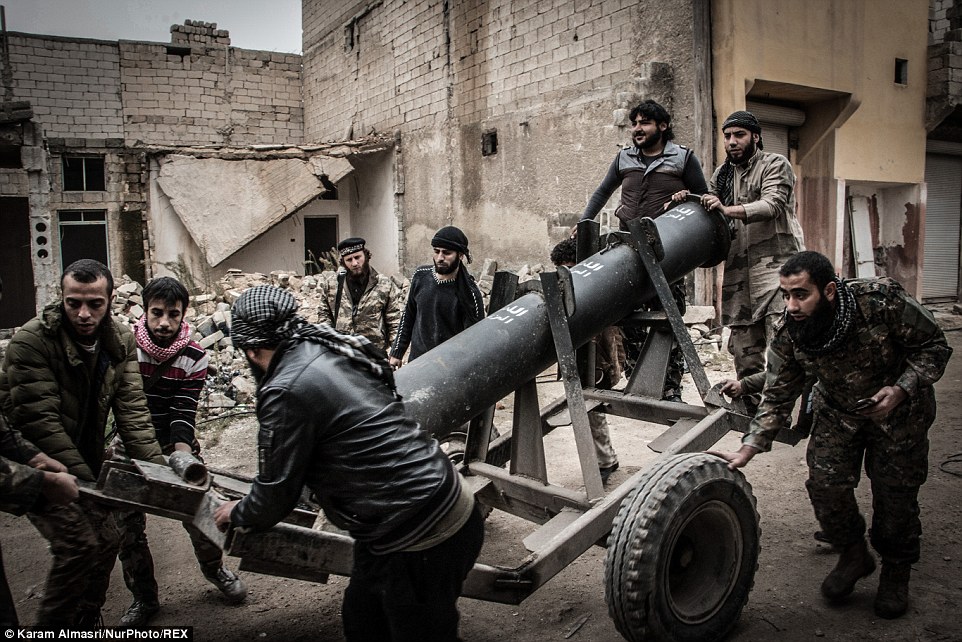
Indeed, in a September 2014 article on mortar and rocket terrorism, I wrote about the bombings prior to the Presidential elections in the Damascus region alone. These bombings hit government-secured cities throughout Syria:
“According to political analyst and Damascus resident Mazen al-Akhras, in the three-month period of April, May and June 2014, terrorist-insurgents fired 994 mortars on Damascus and environs, 426 of which were fired in June (see a list of locations hit and a number of mortars below). On June 3, Election Day in Syria, the terrorist-insurgents fired 151 shells on Damascus, killing 5 and maiming 33 Syrians, Akhras said.”
In December, 2016, all of Aleppo city was liberated of the Nusra, Zenki, and other terrorist factions which had occupied eastern areas (and formerly northern) for years. Syrian and friendly media showed the celebrations which lasted well beyond Christmas, which was celebrated for the first time in years in the overwhelmingly Sunni Muslim city, with Muslims celebrating with their Christian friends and neighbors.
After the liberation of Aleppo, Western and Gulf media, and most of the many concerned human rights groups went silent on Aleppo—as they had been utterly silent on the near-daily murders of civilians and bombings of hospitals on the government side of Aleppo by militants they dubbed ‘rebels’. The number of civilians who died as a result of terrorist snipings, explosive bullets, Hell-Cannon-fired gas cylinder bombs, Grad missiles and other powerful munitions, was nearly 11,000, according to the head of Forensics in Aleppo by late 2016. The media shifted their attention to other areas occupied by al-Qaeda where atrocities could be claimed and White Helmets could perform for their payments.
Western and Gulf media have propagated relentlessly against the Syrian army, and Syria’s allies, distorting realities on numerous occasions, and completely fabricating allegations on numerous others, all with the sole intent of demonizing those who have actually fought terrorism in Syria since this began in 2011. Unsurprisingly, the same Western media which distorted, exploited and lied about Omran Daqneesh is striving to discredit the words of his father, Mohammad.
Mohammad Daqneesh, an unwilling party to the war propaganda, had the following to say about Syria and its army:
Syria comes before anything. I don’t belong to any side. Syria comes first. The Syrian Army protects the country and the people. I served in the Syrian army. The army is the people, and the people are the army.”
Feature photo | The now infamous photo of Omran Daqneesh as he sits in an ambulance in Aleppo, Syria.
Eva Bartlett is a Canadian independent journalist and activist. She has spent years on the ground covering conflict zones in the Middle East, especially in Syria and occupied Palestine, where she lived for nearly four years. She is a recipient of the 2017 International Journalism Award for International Reporting, granted by the Mexican Journalists’ Press Club (founded in 1951), was the first recipient of the Serena Shim Award for Uncompromised Integrity in Journalism, and was short-listed in 2017 for the Martha Gellhorn Prize for Journalism. See her extended bio on her blog In Gaza. She tweets at @EvaKBartlett


